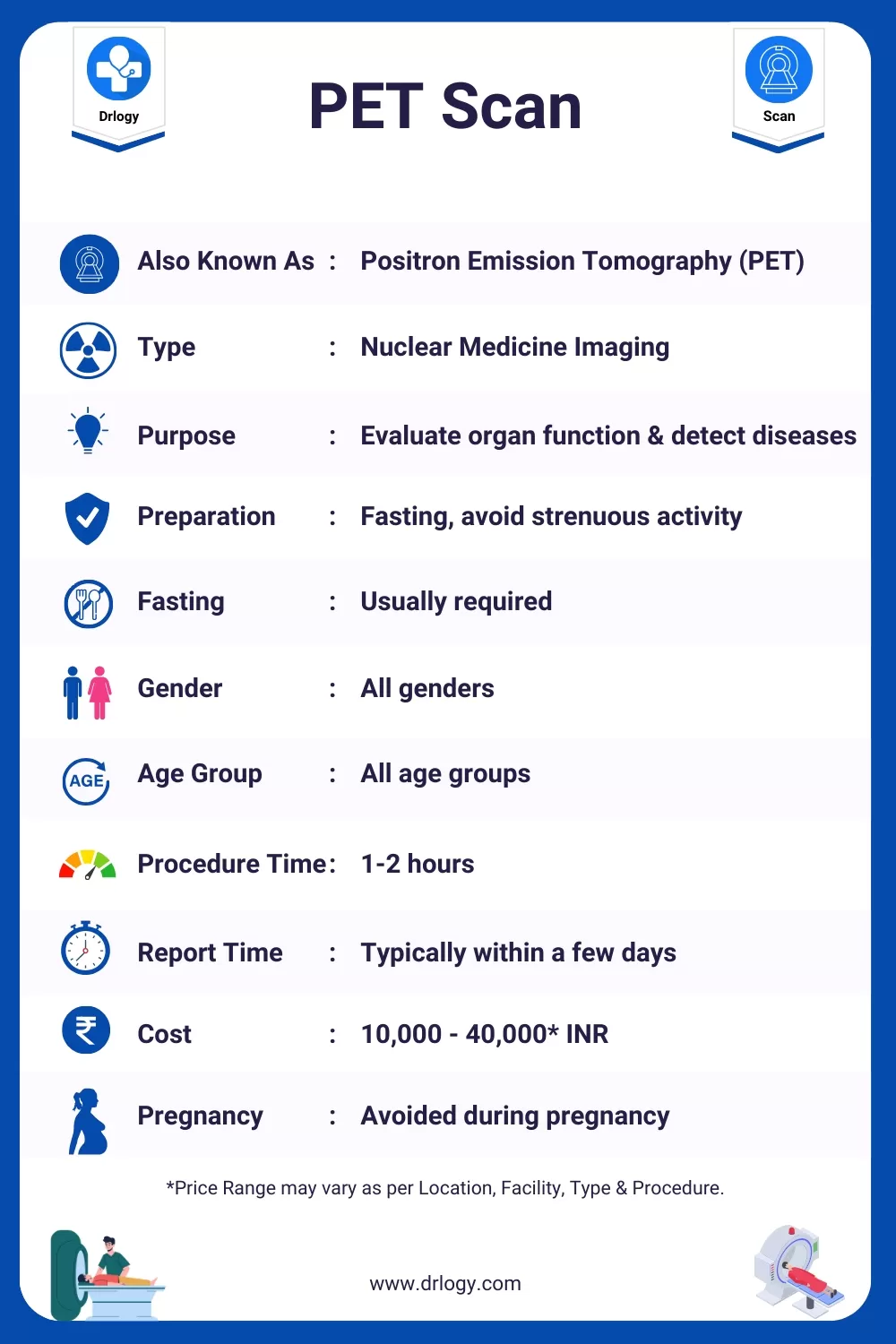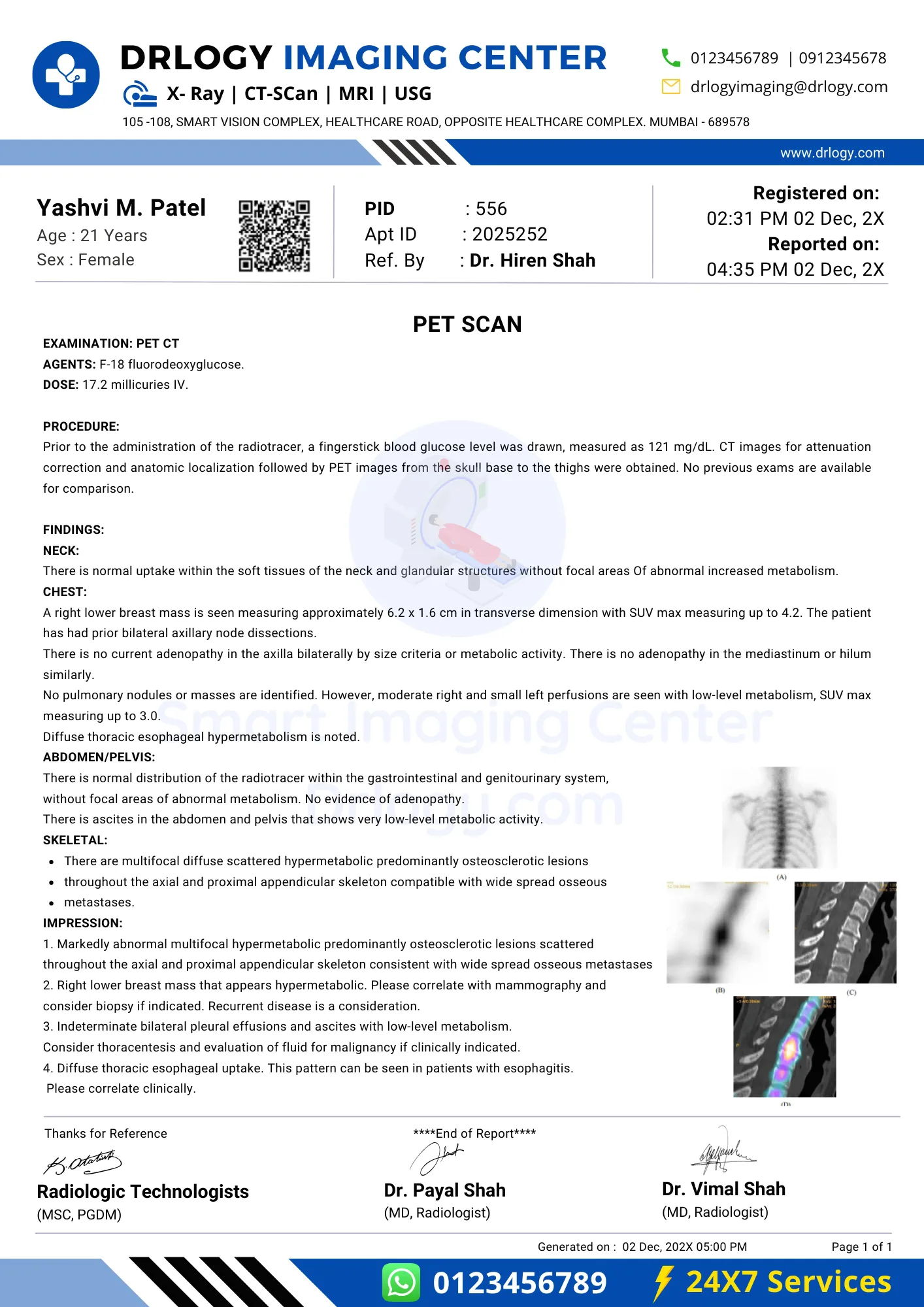
PET Scan for 3D Image Body Scaning For Cancer Treatment
A PET scan is a medical imaging technique that uses a small amount of radioactive material to visualize and assess metabolic activity in the body, aiding in the diagnosis and monitoring of diseases such as cancer and neurological disorders.
What is PET Scan
PET scan stands for Positron Emission Tomography.
- It's a medical imaging technique.
- Involves a small amount of radioactive material.
- This material is called a radiotracer.
- Radiotracer is injected or ingested by the patient.
- Special detectors capture emissions from radiotracer.
- Provides images showing tissue function and metabolism.
PET Scan
Here are the basic details for the PET Scan .
| Also Known As | Positron Emission Tomography (PET) |
| Type | Nuclear Medicine Imaging |
| Purpose | Evaluate organ function and detect diseases |
| Preparation | Fasting, avoid strenuous activity |
| Fasting | Usually required |
| Gender | All genders |
| Age Group | All age groups |
| Procedure Duration | 1-2 hours |
| Reporting Time | Typically within a few days |
| Cost | 10,000 - 40,000* INR |
| Pregnancy Consideration | Avoided during pregnancy |
| Risks and Safety | Low radiation, minor risks of allergies |
| Accessibility | Available in specialized centers |
*Price range may vary as per location, facility, type, and procedure.
What are the Purpose or Reasons for PET Scan?
Here are common reasons for PET Scan.
- Evaluate organ and tissue function
- Detect and stage cancer and tumors
- Monitor cancer treatment response
- Assess neurological disorders and brain function
- Investigate cardiac conditions and blood flow
- Study metabolic processes in the body
- Identify areas of inflammation or infection

Types of PET Scan
Here are the types of PET Scan along with their primary use.
| PET Scan Type | Organ/System | Primary Use |
|---|---|---|
| Whole-Body PET Scan | Whole body | Detect metabolic abnormalities |
| Brain PET Scan | Brain | Assess brain function |
| Cardiac PET Scan | Heart | Evaluate cardiac blood flow |
| FDG-PET/CT Scan | Various | Detect cancer and metastases |
| Gallium Scan | Various | Assess inflammation or tumors |
| Renal Scan | Kidneys | Evaluate kidney function |
| Hepatobiliary Scan | Liver/Gallbladder | Assess liver and bile ducts |
| Lung Ventilation/Perfusion Scan | Lungs | Assess lung function |
| Octreotide Scan | Various | Detect neuroendocrine tumors |
These PET scan types provide valuable insights into specific organs and conditions.
Preparing for Your PET Scan: Tips and Information
Here is the basic preparation before, during, and after PET Scan for any patient.
Before the PET Scan:
- Consultation: Schedule the PET scan and discuss your medical history, allergies, and any concerns with your healthcare provider.
- Fasting: Follow any fasting instructions provided by your healthcare team. Typically, you'll need to fast for several hours before the scan, usually overnight.
- Medications: Inform your healthcare provider about all medications you are taking, as they may affect the scan. You may need to adjust your medication schedule.
- Allergies: If you have known allergies to any substances used in the scan, such as contrast agents, inform your healthcare provider in advance.
During the PET Scan:
- Injection: You will receive a radioactive tracer (often through an IV) before the scan. This tracer helps create detailed images of the inside of your body.
- Waiting Period: After receiving the tracer, there may be a waiting period for it to distribute within your body before the actual scan.
- Positioning: You'll be positioned on the PET scanner table, and the scanner will move slowly over the area of interest.
- Communication: You can communicate with the healthcare team if you have any questions or concerns during the procedure.
After the PET Scan:
- Recovery: Typically, there is no special recovery needed, and you can resume your normal activities immediately.
- Hydration: Drinking fluids can help eliminate the radioactive tracer from your body. Follow any hydration recommendations from your healthcare team.
- Results: Your PET scan results will be reviewed by a specialist, and a report will be sent to your healthcare provider.
- Follow-Up: Schedule a follow-up appointment with your healthcare provider to discuss the PET scan results and any further steps or treatments if needed.
Please note that the specific instructions and procedures can vary based on your medical condition and the type of PET scan you are undergoing. Always adhere to the guidance provided by your healthcare team for a successful and safe PET scan.
Who Performs a PET Scan?
| Professional | Role |
|---|---|
| Nuclear Medicine Technologist | Administers radioactive tracers, operates PET scanner. |
| Radiologic Technologist | Assists during the procedure. |
| Radiologist | Interprets PET scan images, provides a diagnosis. |
PET Scan Procedure
The procedure for PET Scan typically follows these steps:
- Check-in and registration at the PET scan department.
- You may be asked to fast for several hours before the scan (typically 4-6 hours).
- A radioactive tracer, usually FDG (fluorodeoxyglucose), is injected intravenously or administered orally.
- You'll wait for about 30-60 minutes to allow the tracer to distribute in your body.
- You'll be asked to empty your bladder before the scan.
- You'll lie down on an examination table in a quiet room.
- The PET scanner, a large ring-shaped machine, will slowly move over your body.
- The scanner detects signals emitted by the radioactive tracer.
- You'll need to remain as still as possible during the scan, which can take 30-60 minutes.
- You may be asked to hold your breath briefly for certain images.
- The procedure is painless, but it's important to relax and avoid movement.
- After the scan, you can resume normal activities and eating.
- The images are interpreted by a radiologist or nuclear medicine physician.
- You may receive the results during your visit or at a later time.
PET Scan Results
Here are some common elements you might find in a PET Scan report:
| PET Scan Findings | Interpretation |
|---|---|
| Area of Imaging (e.g., brain, chest, etc.) | Normal or Abnormal |
| Standardized Uptake Values (SUV) | Quantitative measurements of radiotracer uptake, if applicable |
| Metabolic Activity | Assessment of increased or decreased metabolic activity |
| Radiotracer Distribution | Information about the distribution pattern of the radiotracer |
| Impression | Summary of key findings or diagnostic impressions |
| Recommendations | Follow-up tests, treatments, or further evaluation, if necessary |
| Conclusion | Final remarks or clinical recommendations |
PET scans are often used to assess metabolic activity and detect abnormalities in various tissues and organs. The results are typically discussed with the healthcare provider, and any abnormal findings would prompt further evaluation and management based on the clinical context.
PET Scan Abnormal Result
Here are potential causes of abnormal PET scan results:
| Abnormal PET Scan Finding | Potential Causes |
|---|---|
| Increased Metabolic Activity | Cancerous tumors, infection, inflammation, metabolic disorders |
| Decreased Metabolic Activity | Areas of tissue damage, decreased blood flow, necrosis |
| Altered Radiotracer Distribution | Abnormal tissue growth, lesions, infections |
| Asymmetry in Activity | Benign tumors, structural abnormalities, positional differences |
| Unusual Focal Uptake | Lesions, focal infections, granulomas |
| Impaired Clearance | Kidney or liver dysfunction, metabolic disorders |
Abnormal PET scan findings require further evaluation by a healthcare provider or specialist to determine the underlying cause and appropriate next steps for diagnosis and treatment. PET scans are valuable for assessing metabolic activity andentifying areas of concern in the body.
How Long Does a PET Scan Take?
The duration of a PET (Positron Emission Tomography) scan can vary based on the specific procedure being performed. Here's a general overview of the approximate time it takes for different types of PET scans:
| PET Scan Procedure | Duration |
|---|---|
| Whole-Body PET Scan | 30 minutes to 1 hour |
| Brain PET Scan | 30 minutes to 1 hour |
| Cardiac PET Scan | 2-3 hours (including rest and stress phases) |
| FDG-PET/CT Scan (commonly used) | 1-2 hours |
| FDG-PET/MRI Scan (less common) | 1-2 hours |
- Please note that these are approximate times and can vary depending on factors such as the type of radiotracer used, the patient's specific condition, and the imaging equipment's capabilities.
- Additionally, some PET scans may require additional preparation time, such as allowing the radiotracer to circulate in the body before imaging.
- Always follow the instructions provided by your healthcare provider for your specific PET scan.
PET Scan Report

PET Scan Limitation
Here are some limitation associated with a PET Scan.
- Radiation exposure
- Allergic reactions to radiotracers
- Pregnancy (avoided if possible)
- Kidney or liver issues (may affect tracer elimination)
- Claustrophobia or anxiety
- Inability to remain still during the scan
PET Scan Risk Factors
Here are some risk factors associated with a PET Scan
- Exposure to ionizing radiation due to radiotracer
- Small radiation dose, but precautions for repeated scans
- Allergic reactions to radiotracers
- Minimal discomfort during injection
- Potential for false-positive or false-negative results
- Operator expertise crucial for accurate scans
- Special precautions for pregnant and breastfeeding individuals
Exploring the Safety of PET Scan: Myth vs Reality
| Myth | Reality |
|---|---|
| High radiation risk | Low radiation exposure |
| Dangerous for all | Specific medical purposes |
| Harmful for health | Generally well-tolerated |
| Invasive procedure | Non-invasive imaging |
| Risky for children | Used in pediatric medicine |
| Permanent effects | Temporary radiation |
| Not for everyone | Risk assessment considered |
PET Scan Price
Here are the estimated PET Scan Price in India with different top cities:
| City | Price Range (INR)* |
|---|---|
| Mumbai | 10,000 - 40,000 |
| New Delhi | 12,000 - 40,000 |
| Bangalore | 10,000 - 40,000 |
| Hyderabad | 12,000 - 40,000 |
| Kolkata | 10,000 - 40,000 |
| Pune | 12,000 - 40,000 |
| Lucknow | 10,000 - 40,000 |
| Noida | 12,000 - 40,000 |
| Surat | 12,000 - 40,000 |
| Gurugram | 10,000 - 40,000 |
| Patna | 10,000 - 40,000 |
| Chennai | 12,000 - 40,000 |
| Jaipur | 12,000 - 40,000 |
| Ahmedabad | 10,000 - 40,000 |
*Prices are approximate and range may vary as per location, facility, type, and procedure.
Summary
Overall, PET Scan provide valuable insights into tissue function and metabolism through safe radiotracer use, aiding in medical diagnosis and research. Also check Drlogy Test for detailed information about all medical tests for patients, doctors, scholers and medical students.
Reference




